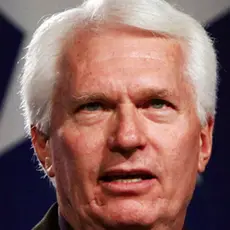Now that Bryan Fischer has hit the big time, I think it is important to remind everyone of a simple fact: Fischer generally has no idea what he is talking about.
Remember a few weeks back when he was claiming that the ruling striking down Arizona's draconian law was unconstitutional on the grounds that the Constitution says the Supreme Court is to have "original jurisdiction" over "all cases...in which a State shall be Party"? That argument turned out to be so ludicrous that even WorldNetDaily dismissed it as nonsense.
Well, Fischer is once again demonstrating his legal genius, blasting Judge Vaughan Walker for suggesting opponents of his Prop 8 ruling might not have standing to appeal. Here's is Fischer's brilliant analysis:
Judge Walker appears oblivious to the blatant self-contradiction in his ruling. If Prop. 8 proponents do not have standing, what in the world was he doing allowing them to argue in his courtroom on behalf of natural marriage for two weeks?
Oh, that's right, it gave him the chance to be the center of the universe for one brief shining moment. For him to have denied standing would have deprived him of his fifteen minutes, and he wasn't about to put up with that. He granted standing just long enough to get his picture in every newspaper in the country and become the darling of the effeminate left. He even tried to become a daytime TV star until the Supreme Court smacked him down. And then, when his fifteen minutes were up, he tried to tell everybody to go home.
...
The Ninth Circuit has scheduled a court date for the appeal of Judge Walker's ruling, but curiously have directed the proponents of Prop. 8 to come before it and address the issue of standing.
What the Ninth Circuit has done, in all its infinite judicial wisdom, and without apparently even realizing it, is to settle this question before it's even argued in court. For if the proponents have standing to argue standing, then they have standing. If they have no standing, they shouldn't have been scheduled even to make arguments for standing.
The mere fact that the Ninth Circuit is inviting them into court to make the case for standing means, if logic and consistency mean anything, that the court has already decided this question in the affirmative.
We'll see if they're rational enough to figure out what they've done here. Being as how they're liberals, all bets are off on that one. They can hardly now rule against the standing of Prop. 8 proponents, because a higher court will say, well, if they had no legal right to be there, why did you even let them in your court in the first place?
First of all, Walker didn't say Prop 8 proponents didn't have standing in the initial case, he said they might not have standing to appeal ... and the issue standing is going to be an important question in moving the case forward in the appeals process:
[A]dvocates of Prop 8, who are launching the appeal, may not have the necessary standing to carry it forward. The case is titled Perry v. Schwarzenegger, with Gov. Arnold Schwarzenegger and other officials in the position of defending the ballot initiative. But those officials, who are sympathetic toward gay marriage to varying degrees, are not inclined to appeal Walker's ruling.
Under Supreme Court precedent, it's unclear that proponents of legislation would have standing to defend it if state officials are not themselves defending it, because they can't show that they are suffering the necessary injury. In Arizonans for Official English v. Arizona, a 1997 case, the Court expressed "grave doubts" about the ability of such groups to challenge rulings that strike down ballot initiatives.
"There is a very serious standing issue," said George Washington University Law School associate dean Alan Morrison, a longtime expert on standing and civil procedure. The Arizona precedent, he said, "came right up to the edge" of saying there was no standing for groups like those that favor Proposition 8. Morrison also noted that since that ruling, new members like Chief Justice John Roberts Jr. and Samuel Alito Jr. have joined the Court and are "no friends of expanding standing." Setting high standards for standing has been one of several gatekeeping procedural doctrines conservative justices have used to weed out what they view as excessive or frivolous litigation from the courts.
The issue of standing is the very question the Ninth Circuit is going to be examining and why the court is explicitly telling Prop 8 supporters who are appealing Walker's ruling "to include in their opening brief a discussion of why this appeal should not be dismissed for lack of Article III standing."
The fact that Prop 8 supporters are going to be in court does not prove that they have standing because that is the very question they are going to be in court trying to decide.






